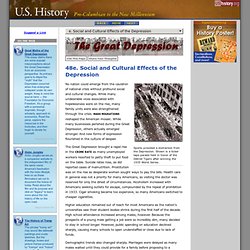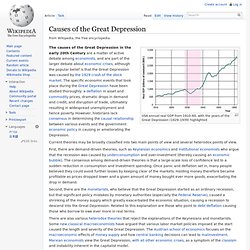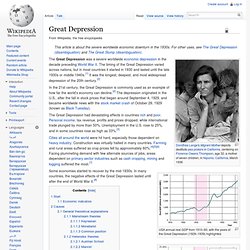

ANNOTATED BIBLIOGRAPHY. Summary of the book ~ Dust to Eat ~ by Michael L. Cooper. What Ended the Great Depression? FEBRUARY 24, 2010 by BURTON FOLSOM What finally ended the Great Depression?

That question may be the most important in economic history. If we can answer it, we can better grasp what perpetuates economic stagnation and what cures it. The Great Depression was the worst economic crisis in U.S. history. From 1931 to 1940 unemployment was always in double digits. On the surface World War II seems to mark the end of the Great Depression.
Some economists—especially Robert Higgs—have wisely challenged that conclusion. Even President Roosevelt and his New Dealers sensed that war spending was not the ultimate solution; they feared that the Great Depression—with more unemployment than ever—would resume after Hitler and Hirohito surrendered. FDR had halted many of his New Deal programs during the war—and he allowed Congress to kill the WPA, the CCC, the NYA, and others—because winning the war came first. But 1946 was very different from 1933. As Sears, Roebuck and Company Chairman Robert E. Summary ~ what ended the great depression? ~ Who was reponsible for the great depression. Who was reponsible for the great depression? Why did the Great Depression happen? Past Economic Troubles. Social and Cultural Effects of the Depression. Sports provided a distraction from the Depression.

Shown is a ticker tape parade held in honor of the Detroit Tigers after winning the 1935 World Series. No nation could emerge from the cauldron of national crisis without profound social and cultural changes. While many undesirable vices associated with hopelessness were on the rise, many family units were also strengthened through the crisis. Mass migrations reshaped the American mosaic. While many businesses perished during the Great Depression, others actually emerged stronger. The Great Depression brought a rapid rise in the crime rate as many unemployed workers resorted to petty theft to put food on the table. Higher education remained out of reach for most Americans as the nation's universities saw their student bodies shrink during the first half of the decade. Demographic trends also changed sharply. Mass migrations continued throughout the 1930s.
Popular culture saw new trends as well. Report broken link Report broken link. Effects of The Great Depression note. Causes of the Great Depression. USA annual real GDP from 1910–60, with the years of the Great Depression (1929–1939) highlighted The causes of the Great Depression in the early 20th Century are a matter of active debate among economists, and are part of the larger debate about economic crises, although the popular belief is that the Great Depression was caused by the 1929 crash of the stock market.

The specific economic events that took place during the Great Depression have been studied thoroughly: a deflation in asset and commodity prices, dramatic drops in demand and credit, and disruption of trade, ultimately resulting in widespread unemployment and hence poverty. However, historians lack consensus in determining the causal relationship between various events and the government economic policy in causing or ameliorating the Depression.
Current theories may be broadly classified into two main points of view and several heterodox points of view. General theoretical explanations[edit] Mainstream theories[edit] Causes. Great Depression. USA annual real GDP from 1910–60, with the years of the Great Depression (1929–1939) highlighted.

The unemployment rate in the US 1910–1960, with the years of the Great Depression (1929–1939) highlighted. In the 21st century, the Great Depression is commonly used as an example of how far the world's economy can decline.[2] The depression originated in the U.S., after the fall in stock prices that began around September 4, 1929, and became worldwide news with the stock market crash of October 29, 1929 (known as Black Tuesday). The Great Depression had devastating effects in countries rich and poor. Personal income, tax revenue, profits and prices dropped, while international trade plunged by more than 50%. Unemployment in the U.S. rose to 25%, and in some countries rose as high as 33%.[3] Cities all around the world were hit hard, especially those dependent on heavy industry. Some economies started to recover by the mid-1930s.
Start Economic indicators Causes General theoretical explanations. Great Depression.